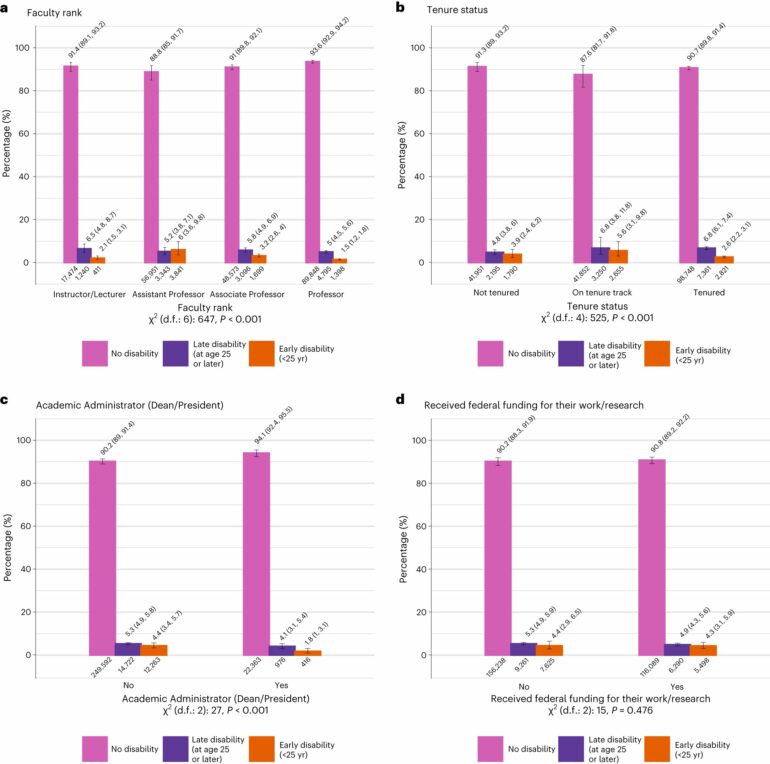New research from the Johns Hopkins Disability Health Research Center suggests that Ph.D. graduates in science, technology, engineering and medicine (STEM) in the U.S. who became disabled before age 25 earn $14,360 less per year in academia than those without disabilities. They are also underrepresented at higher faculty levels (such as deans and presidents) and in tenured positions.
The findings are published in the journal Nature Human Behaviour.
“We’re identifying the barriers to inclusion so we can dismantle them,” says Bonnielin Swenor, Ph.D., MPH, Endowed Professor of Disability Health and Justice and founder of the Johns Hopkins Disability Health Research Center. “Combating the disparities will take structural transformation.”
Previous research has revealed pay disparities and unequal representation in STEM for women and underrepresented racial minorities in the U.S.; research has also identified that scientists and engineers with disabilities (regardless of the age of disability onset) are more likely to be unemployed than the overall U.S. labor force. However, data on disparities for STEM doctoral recipients with disabilities have been lacking.
Dr. Swenor and colleagues examined evidence for differences in salary and representation of STEM Ph.D. graduates with disabilities before 25 years of age and those with disabilities at 25 years of age or later, compared to doctorate recipients without disabilities. The authors used national data on nearly 1.15 million U.S. research doctorate recipients who received degrees between 1973 and 2017.
Of their sample, 704,013 individuals were still working in STEM (including 36,807 individuals who reported disabilities experienced in later life and 20,544 people who reported disabilities from early in life). Within this subset, they matched individuals by socioeconomic background, job and degree-related characteristics.
Across all employment sectors, STEM Ph.D. graduates with disabilities earned $10,580 less per year than their counterparts without disabilities—and in academia, they earn US $14,360 less. The authors also found those with disabilities were underrepresented at higher faculty levels (such as deans and presidents) and in tenured positions. The authors call for structural transformations to combat these disparities.
“The Disability Health Research Center aims to shift the paradigm from ‘living with a disability’ to ‘thriving with a disability’ and uses data-driven approaches to drive change in many sectors, including in STEM,” says Dr. Swenor.
Today more than 27% of American adults have disabilities, and yet people with disabilities still face many barriers to health, equity, and inclusion.
Study authors include Bonnielin Swenor, Franz Castro (JHSON), Elizabeth Stuart (JHSPH), Jennifer Deal (JHSPH; JHSOM), and Varshini Varadaraj (JHSON).
More information:
Franz Castro et al, STEM doctorate recipients with disabilities experienced early in life earn lower salaries and are underrepresented among higher academic positions, Nature Human Behaviour (2023). DOI: 10.1038/s41562-023-01745-z
Provided by
Johns Hopkins School of Nursing
Citation:
PhD graduates with disabilities are underpaid and underrepresented in US academia: Study (2023, November 27)
